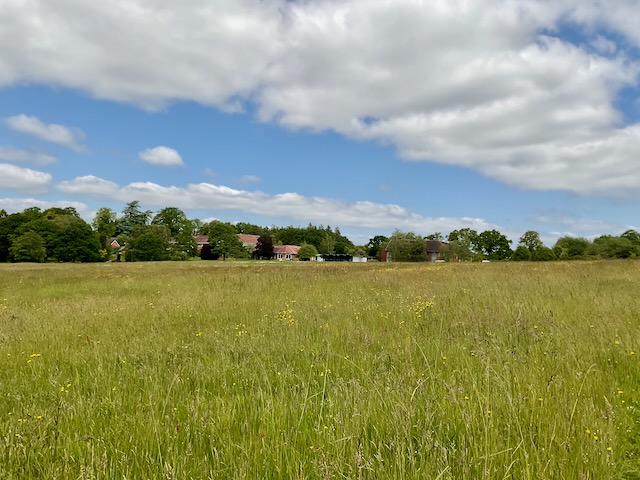Complex responsive processes of relating

Complex responsive processes of relating
Last week I had the pleasure to participate in the complexity and management conference at Roffey Park in the UK. The conference is the annual gathering of faculty, current candidates, and alumni of the Doctorate in Management (DMan) programme at the University of Hertfordshire Business School - which is open for other people like me to join and participate. And it is indeed a very participatory conference. Aside from the introductory day and the keynote lecture as good as no projector was used. The conference is largely about having conversations - starting at the bar before the inaugural dinner the night before the conference, continuing in groups throughout the conference, and culminating in a long, large-group conversation at the end.
Unstructured large group conversations are one of the methods used in the work of the group and also in the teaching and research in the DMan programme - and in the conference. Not surprisingly, then, is that one of the four pillars of theory behind the work is group analytic psychotherapy. These processes are quite unusual I would say - they are actually not too different from Warm Data Labs, as they do not give any instructions on how one has to behave - such as in many other methods that for example tell you how to listen to others (empathically) or how to feel (appreciative). Humans are taken as they are - messy, sometimes unpleasant, sometimes unhappy - and the group is given the task to engage with all of that in a reflective way. There is no moderator or facilitator or topic or question. What is interesting is that the group is invited to reflect on itself and what is happening in the group. Sometimes this can acquire some bizarr notions like when we talked about why there were so many empty chairs in the room (one group of people decided not to join the conversation) and then one person asked why we spend so much time talking about inanimate objects (the chairs.) It can induce quite a bit of anxiety if one is not used to engaging in this way with a large group of other people. I was at some points ready to leave the room. But at the same time it is extremely powerful as there are multiple dynamic reflective processes happening in parallel - the internal one inside each participant, the interaction between the participants, and the reflection of the participants about both what they experience inside and outside of themselves.
The other three roots of complex responsive processes of relating (that is how the frame of reference applied in the programme is called) are evolutionary complex adaptive systems theory used as an analogy, process sociology of Norbert Elias, and pragmatic philosophy (which actually creates a link to Warm Data, which is also drawing on one of the early pragmatists: Charles Sanders Peirce). This mix results in quite a unique take on complexity in organisations and society, which I really enjoyed and which gives me some complementary insights to the other bodies of thought around complexity I have engaged with – in particular anthro-complexity of Dave Snowden as well as Gregory and Nora Bateson's work.
Mentioning these other bodies of thought around complexity and system: interesting and strange for me during the conference were the subtle acts of identity creation through an 'us vs them dynamic'. This became most visible both when the people at the conference who are steeped in that way of seeing the world attempt to differentiate their way of thinking from others, including the tradition of approaches that differentiate between situations that are complex and those that are ordered (in particular the community around Dave Snowden and his Cynefin framework, which differentiates between clear, complicated, complex, chaotic and aporetc states). The stance of complex responsive processes of relating is that everything is always complex. At the same time they acknowledge that to maintain a train system so it runs on time is a complicated endeavor, embedded in a complex context of human interactions. However, for me this is almost a semantic difference, as it essentially says that as far as human experience is concerned, not everything is always complex. We can indeed identify aspects of human interactions that are not and should not be complex - and this includes certain forms of social institutions I think. Another aspect I picked up is the resistance to talk about systems. I share that, because the idea of a system and what claims to be systemic ways of acting often go back to mechanistic systems that can be controlled.
The Paper Museum
From the recently released book 'Complexity and Leadership' (Chauhan, Crewe, and Mowles 2022) describing the approach to research the Doctorate in Management in Complexity and Management is taking:
To ensure a rigorous attention to practice, all contributors generate their data in part by relating narratives of real experience. The historicity of narrative enforces a practical and theoretical unfolding of action, ideas and intention over time and in specific places, whether they are Israeli companies, the Danish public sector or UK universities. This kind of narrative inquiry and analysis involves practice-based theorising rather than the construction of theory based on taxonomy.
Why have I added this to my paper museum? I like this mix of theory and practice informing each other and I think this is a good example of how a discipline is applying its own insides on itself – complexity sciences on how you would do research in a complex system.
Reference: Chauhan, Kiran, Emma Crewe, and Chris Mowles. 2022. Complexity and Leadership. Routledge.
Photo
View of Roffey Park institute from a walk through the beautiful grounds. My own photo.